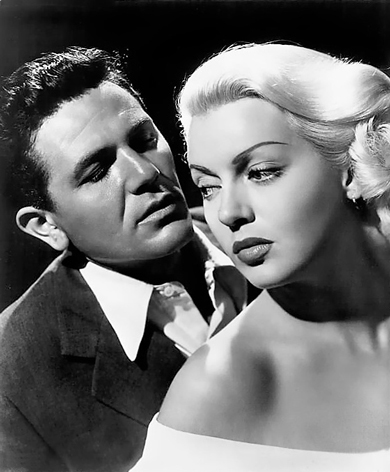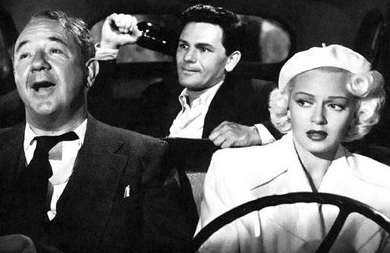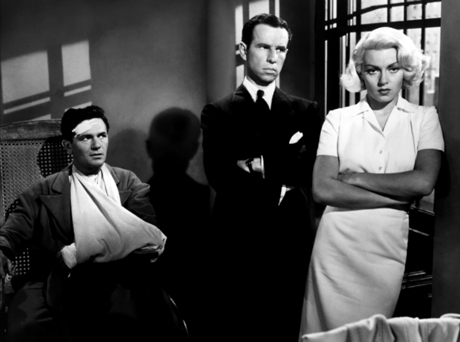
 |
|
|
|
James M. Cain was the king of sordid crime stories that, in Billy Wilder's words, put murderous lovers on a streetcar and wouldn't let them off until the last stop, at the cemetery. Wilder's adaptation of Cain's Double Indemnity set the standard for hardboiled noir adaptations of pulp detective stories and murder mysteries. A second James M. Cain classic, Mildred Pierce came out in less than a year. It deftly re-contoured Cain's scorching novel into something that Hollywood could slip past the censors. A year after that came Cain's most famous sexed-up page-turner, a tale of murder and corruption at the low end of the social scale. MGM's The Postman Always Rings Twice was given the same kind of production gloss that de-boned Tortilla Flat of its period flavor and atmosphere. With woo-bait Lana Turner and new proletarian hero John Garfield plotting a half-baked murder scheme, the picture was a big hit. Now it comes off as rather spotty, with some good acting and a number of still-jolting cynical plot turns. 
As with James M. Cain's other tales of dissatisfaction in the lower middle class, Postman is a story of moral malaise, Southern California style. Self-confident drifter Frank Chambers (John Garfield) takes a job slinging hash at the roadside beanery of Nick Smith (Cecil Kellaway), an elderly Canadian with a hot number for a wife, Cora (Lana Turner). Frank and Cora try their best to avoid the obvious, but eventually succumb to the temptation to knock off her husband. Little do they know what pitfalls await them when the District Attorney Kyle Sackett (Leon Ames) and defense counsel Arthur Keats (Hume Cronyn) enter the picture. Double Indemnity captured an intensity in adulterous love that spawned a flood of pessimistic film noir thrillers. It also opened up the production code to material previously considered strictly taboo. Mildred Pierce presented the sordid ambition of a depression-era working class housewife desperate to improve her station. This film version of The Postman Always Rings Twice retains the convoluted turns of Cain's novel but already seems a derivative retelling of stock elements, despite the presence of a classic femme fatale in Cora Smith. Billy Wilder's dialogue turned hardboiled patter into an art form, and Michael Curtiz' breathless direction made the occasional dud line in Mildred Pierce irrelevant. By contrast, Tay Garnett's flat, straightforward direction lets the constant gab in Postman get out of hand. Characters talk far too much about how they feel at any given moment, so that the rapid series succession of romantic flip-flops at the end seem oddly forced. We admire Postman's reasonably uncompromised story, John Garfield's powerhouse acting and Lana Turner's sex appeal. Perhaps her 'type' has dated, but I find little to like in most of Lana Turner's performances. In the latter chapters of Postman she's at her very best, projecting a vulnerability that's much more convincing than her "hot number" act up front. Turner's glamour shots still look like poses, especially her introduction in white shorts, standing stiffly after dropping her lipstick. She hardly looks natural waiting tables with nary a platinum hair out of place. The patrons of Nick's diner are remarkably understanding, considering how little service they receive. Dramatic scenes frequently unwind in the back rooms while twenty customers sit unattended out front. Yet Lana never has to step lively or deliver plates of food to anybody. And who is cooking all of those meals? 
That's a superficial observation, but Turner's glamorous image gets in the way of her acting. I think one needs to be a confirmed fan to feel the electricity between her and Garfield. Cora's cold heart melts somewhat in the last act but her character veers between emotional extremes. She makes some really dumb decisions. John Garfield is a natural for this role. We feel every bead of sweat on his forehead, whether planning a murder or squirming under the merciless manipulation of the delightfully reptilian Hume Cronyn. Garfield carries the first half of the film on his back. The supporting work is excellent. Cecil Kellaway (The Beast from 20,000 Fathoms) plays Nick Smith without sentiment, as an old dog taht needs to be gotten out of the way. Leon Ames is just okay, never seeming as corrupt as he should be, but Hume Cronyn is remarkable as Keats, the predatory defense counsel. Keats sneers at his clients while playing everyone for a patsy -- Cora, Frank, and the law itself. We keep expecting Keats to blackmail the couple with the confession he has locked away in his safe. The film's cynical attitude toward the law must have made the schmaltzy Louis B. Mayer physically ill. The legal system becomes a cheap toy to be twisted into knots by the merciless Sackett and the sardonic Keats. The ambitious schemers bulldoze the gullible couple without a second thought. Cora and Frank have what it takes to turn the tables on a couple of second-tier blackmailers, but never have a chance against Keats' manipulative tricks. Once again, MGM hypocritically offsets the 'immoral' content with eleventh-hour sermonizing. (spoiler) Frank does a big An American Tragedy-- type plea for understanding while awaiting execution, as Leon Ames' hardboiled D.A. morphs into a sympathetic figure. The final accident is treated as a moral retribution, and the irony of being convicted for the wrong murder becomes holy justice. 
Despite MGM's glamorous trappings, the film does manage a definite moral bleakness. Even more sordid possibilities arise when Frank finds a blonde in a thin dress (Audrey Totter) sitting in a stalled car and waiting for a pickup. The relationship between Cora and Frank definitely goes out of whack after the trial, with each harboring suspicions, and then hoping that trust can be re-established. This classic of film noir can't really come to grips with Cain's vision of lovers sharing poisonous secrets they can't tell anyone else. It made a big splash when new and is a favorite of audiences that enjoy the pairing of Lana Turner and John Garfield. Warners' Blu-ray of The Postman Always Rings Twice is a big improvement on the older DVD, eliminating a few damaged moments and conveying the clean lines of the glossy, flat photography. George Bassman's overemphatic score (dat - da - DAH!) has the appropriate punch. The old extras are here plus a couple of new items. Film Historian Richard Jewell provides an illustrated introduction that should not be seen before the show itself. Warners has included a Crime Does Not Pay short subject Phantoms, Inc. and the Tex Avery Cartoon Red Hot Riding Hood but neither are in HD. Biographical TCM documentaries for both of the stars are included, each hosted by a surviving daughter. Lana Turner... A Daughter's Memoir (90 min) is the one that includes staged recreations of the infamous Johnny Stompanato killing, a true-life noir Hollywood scandal mess if ever there was one. Plenty of real newsreel footage is included as well; Lana's performance in the witness stand is up to her acting standard. The John Garfield Story (60 min.) concentrates on the star's martyrdom at an early age, hounded by the HUAC. Some good & sincere interviews attest to Garfield's character and the photos and film clips are nicely done. There's also some pretty outrageous scenery chewing to be weathered, from actor Richard Dreyfuss. The only surviving cast member on screen is the talented Hume Cronyn, but we also hear sympathetic words from Lee Grant and others. Garfield comes off as a dynamic actor victimized by his left-leaning associations. A trailer is included as well.
On a scale of Excellent, Good, Fair, and Poor,
Blu-ray rates:
Reviews on the Savant main site have additional credits information and are often updated and annotated with reader input and graphics. Also, don't forget the 2011 Savant Wish List. T'was Ever Thus.
Review Staff | About DVD Talk | Newsletter Subscribe | Join DVD Talk Forum |
| ||||||||||||||||||